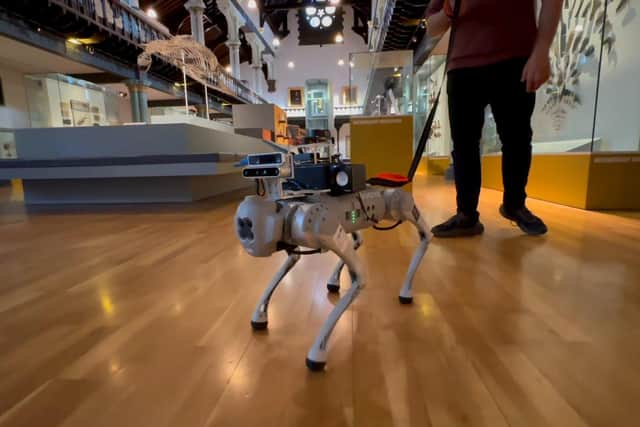University develops robot guide dog to help the blind
A university has developed a talking robot guide dog to help the blind - powered by sophisticated Artificial Intelligence (AI).
Experts from the University of Glasgow have partnered with charities to develop the RoboGuide.
Advertisement
Hide AdAdvertisement
Hide AdThe four-legged robot is designed to help blind people navigate through public spaces independently.


The prototype uses a series of sensors on the dog-shaped body to map and assess its surroundings, paired with software which enables it to interpret the data and avoid obstacles in real time.
It incorporates language model technology - meaning that the robot can interpret and respond verbally to questions asked by its users.
Staff at the University of Glasgow aim to bring a more complete version of the technology to market in the years to come.
Dr Olaoluwa Popoola, of the University of Glasgow's James Watt School of Engineering, is the RoboGuide project's principal investigator.
He said: "Assistive technologies like the RoboGuide have the potential to provide blind and partially sighted people with more independence in their daily lives in the years to come.
"One significant drawback of many current four-legged, two-legged and wheeled robots is that the technology which allows them to find their way around can limit their usefulness as assistants for the visually impaired.
"Robots which use GPS to navigate, for example, can perform well outdoors, but often struggle in indoor settings, where signal coverage can weaken.
Advertisement
Hide AdAdvertisement
Hide Ad"Others, which use cameras to 'see', are limited by line of sight, which makes it harder for them to safely guide people around objects or around bends."
Working in collaboration with the Forth Valley Sensory Centre Trust and the Royal National Institute of Blind People Scotland, the team hope that their robot will eventually be able to help support the 2.2 billion people globally who live with sight loss.
Prof Muhammad Imran, dean of graduate studies at the University of Glasgow's James Watt School of Engineering, is co-investigator on the project.
He said: ''Our assistive technology project for the visually impaired embodies innovation, fostering inclusivity.
"In Glasgow, we're pioneering world-changing technologies that hold the potential to transform lives and reshape societal norms.
"This achievement was made possible through collaboration with industry and charity partners and co-creating the design with the invaluable input of end users."
Dr Wasim Ahmad, of the James Watt School of Engineering, and co-investigator on the project said: "We're pleased to be working closely with the FVSC and RNIB Scotland to test the RoboGuide in real-world environments, and to integrate their feedback into more refined iterations of the technology.
"Ultimately, our aim is to develop a complete system which can be adapted for use with robots of all shapes and sizes to help blind and partially sighted people in a wide range of indoor situations.
Advertisement
Hide AdAdvertisement
Hide Ad"We hope that we can create a robust commercial product which can support the visually impaired wherever they might want extra help."
Jacquie Winning MBE, the chief executive of the Forth Valley Sensory Centre, said: "Mobility is a big issue for the blind and partially sighted community. RoboGuide is a wonderful solution to that problem."
The nine-month research project is supported by funding from the Engineering and Physical Sciences Research Council (EPSRC), part of UKRI, through the Impact Acceleration Account programme.